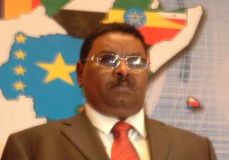Sudan, neighbors discuss working against terrorism
Sept 21, 2005 (KHARTOUM) — Sudan – listed by the U.S. as a terrorism sponsor – sat down with its neighbors Wednesday to discuss how to work together to fight terrorism in their unstable region.

U.S. counterterrorism officials have increasingly turned their attention to Africa, saying terrorists could be seeking havens or staging grounds on a continent with porous borders and weak governments.
Sudanese security chief Gen. Salah Abdullah Gosh, who rarely appears in public, said during the nationally televised opening of a high-profile counterterrorism conference that his country was now united, leaving war behind, and determined to help bring peace to the region.
Sudan’s once hard-line Islamist government in January signed a peace treaty with rebels from the Christian and animist south, and has in recent years tried to project a moderate image. But it has found it difficult to shake a past that includes harboring al-Qaida chief Osama bin Laden and allegedly helping Muslim extremists in a failed plot to assassinate Egyptian President Hosni Mubarak.
Sudanese leaders have repeatedly asked to be taken off the U.S. list of countries sponsoring terrorism. The U.S. has called Sudan an important partner in the global war on terror, but not yet struck it from the list, on which it first appeared in 1993.
U.S. observers were on hand Wednesday for the counterterrorism conference, which drew security chiefs from Burundi, Chad, Comoros, Congo, Djibouti, Egypt, Ethiopia, Kenya, Libya, Madagascar, Rwanda, Tanzania, Uganda and Zambia. Observers from the Algeria, Saudi Arabia, the U.K. and Yemen also attended.
Kenya, twice hit by al-Qaida, sent its top security and intelligence official, Brig. Wilson Boinet.
“This is a war,” Boinet, who, like his Sudanese counterpart rarely appears in public, said during the opening session. “It is shadowy and has no front line and it has no trenches and knows no boundaries or religion, but we are called upon all to fight it.”
An al-Qaida cell attacked the U.S. embassies in Nairobi, Kenya and Dar es Salaam, Tanzania in 1998, killing 12 Americans and more than 200 Africans. The al-Qaida controller for those attacks, Fazul Abdullah Mohammed, escaped Kenya to Somalia following the bombings, and in 2002 organized the car bombing of an Israeli hotel in Mombasa, Kenya after which he again reportedly went to lawless Somalia.
Chad, one of the countries attending the Khartoum conference, joined eight other African countries in U.S.-led counterterrorism exercises earlier this year.
The exercises marked the start of an expanded U.S. counterterrorism effort in Africa, encompassing Morocco, Algeria, Tunisia, Senegal, Mali, Niger, Mauritania, Chad and Nigeria. An earlier U.S. effort involved just Mali, Mauritania, Chad and Niger.
In his opening remarks at the Khartoum conference, Sudanese President Omar el-Bashir condemned terrorism, but said the world must agree on what constitutes terrorism before it can be effectively fought. Muslim leaders have said the U.S.-led war on terror demonizes Islam and ignores attacks on Muslims.
“The unified definition of terrorism, without application of double standards, for combating it will be the first correct step in the road to combating terrorism,” el-Bashir said.
“We call for a free and frank dialogue among and between all religions and various culture so that we will work together to counter the threat of terrorism which we all face,” el-Bashir added.
The conference was to release recommendations after two days of closed sessions.
(AP/ST)
